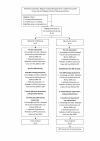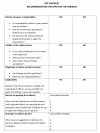Effectiveness of the tailored EBP training program for Filipino physiotherapists: a randomised controlled trial
- PMID: 21489229
- PMCID: PMC3100239
- DOI: 10.1186/1472-6920-11-14
Effectiveness of the tailored EBP training program for Filipino physiotherapists: a randomised controlled trial
Abstract
Background: Evidence implementation continues to challenge health professionals most especially those from developing countries. Filipino physiotherapists represent a group of health professionals in a developing country who by tradition and historical practice, take direction from a doctor, on treatment options. Lack of autonomy in decision-making challenges their capacity to deliver evidence-based care. However, this scenario should not limit them from updating and up-skilling themselves on evidence- based practice (EBP). EBP training tailored to their needs and practice was developed to address this gap. This study will be conducted to assess the effectiveness of a tailored EBP-training program for Filipino physiotherapists, in improving knowledge, skills, attitudes and behaviour to EBP. Participation in this program aims to improve capacity to EBP and engage with referring doctors to determine the most effective treatments for their patients.
Methods/design: A double blind randomised controlled trial, assessing the effectiveness of the EBP training intervention, compared with a waitlist control, will be conducted. An adequately powered sample of 54 physiotherapists from the Philippines will be recruited and randomly allocated to EBP intervention or waitlist control.
Intervention: The EBP program for Filipino physiotherapists is a one-day program on EBP principles and techniques, delivered using effective adult education strategies. It consists of lectures and practical workshops. A novel component in this program is the specially-developed recommendation form, which participants can use after completing their training, to assist them to negotiate with referring doctors regarding evidence-based treatment choices for their patients.Pre and post measures of EBP knowledge, skills and attitudes will be assessed in both groups using the Adapted Fresno Test and the Questions to EBP attitudes. Behaviour to EBP will be measured using activity diaries for a period of three months.
Discussion: Should the EBP-training program be found to be effective in improving EBP-uptake in Filipino physiotherapists, it will form the basis of a much needed national intervention which is contextually appropriate to Filipino physiotherapists. It will therefore form the genesis for a model for building EBP capacity of other health professionals in the Philippines as well as physiotherapists in developing countries.
Trial registration: Current Controlled Trials: ISRCTN74485061.
Figures
References
-
- Sackett DL, Straus SE, Richardson SW, Rosenberg W, Haynes BR. Evidence-based Medicine. Churchill Livingstone; 2000.
-
- Schreiber J, Stern P. A review of the literature on evidence-based practice in physical therapy. The Internet Journal of Allied Health Sciences and Practice. 2005;3(4)
-
- Metcalf C, Lewin R, Closs J, Hughes C, Perry S, Wright J. Research in the NHS: A survey of four therapies. British Journal of Therapy and Rehabilitation. 2000;7(4):168–175.
Publication types
MeSH terms
Associated data
LinkOut - more resources
Full Text Sources
Miscellaneous



